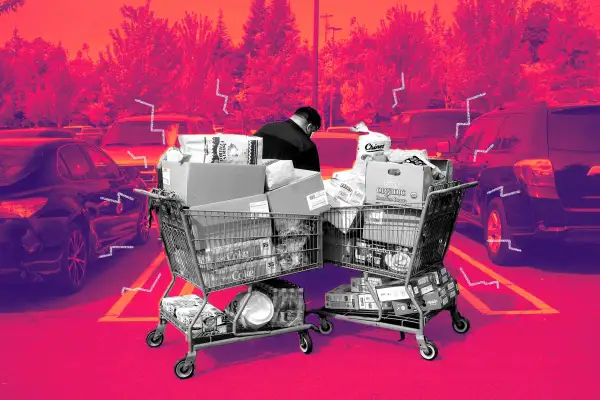Stockpiling Before Trump’s Tariffs? Experts Warn It Could Backfire

As tariffs on China take effect — and possible tariffs on Mexico and Canada loom — you may be wondering if it would be smart to stock up on imported products before costs go up.
If so, you're not alone. A recent survey by Bid-on-Equipment.com found that 12% of people were already "stockpiling" goods due to tariff-related concerns. That follows a separate survey, released in January by researchers at the University of Texas, University of California at Berkeley and the University of Chicago, in which more than 40% of respondents said they were "likely to stockpile goods before tariffs hit."
The future effects on consumers of any proposed tariffs are unknown. While President Donald Trump talks in "maybe… maybe not" terms about whether tariffs will bring "pain," economists say the answer is likely "yes." Ultimately, the risk of inflation could sway the admin to not go through on enacting major tariffs on Canada and Mexico — but it's unclear.
Meanwhile, a 10% tariff on imports from China went into effect Tuesday, which was immediately met with counter-tariffs. Trump's tariff action with China could affect an estimated $400 billion of goods that Americans buys annually.
According to the nonpartisan Tax Foundation, tariffs on all three countries would amount to an $800 tax on American consumers in 2025 and "would rank as the largest tax increase in more than 30 years."
And due to stockpiling, “the inflationary consequences of the tariffs will manifest themselves even before the tariffs are put in place, further complicating the Federal Reserve’s job of bringing inflation back down to its target,” the aforementioned university researchers wrote in a working paper.
Should you stockpile ahead of tariffs?
Experts are discouraging consumers against "doom spending" over tariffs as concern rises that excessive stockpiling could lead to higher prices or even supply crunches. (Remember in 2020 when toilet paper stockpiling briefly spiraled into a mini crisis as everyone made runs on the stores?)
Amir Mousavian, professor of supply chain management at the University of New England’s College of Business, told CNBC that stockpiling could cause more harm to consumers in the way of shortages, outweighing the possible marginal benefits.
Stockpiling is also inherently difficult because many items are perishable and there are really only so many use cases in which you could practically stockpile. Unless you have room in your garage, where are you going to store a giant Walmart haul of goods from Mexico and Canada?
If you're at the point where you're asking yourself if you should fill up your freezer with avocados, maybe pause and question if you're trying too hard to min-max the situation. That's also money you're literally freezing away that you could have been using for anything else, like earning interest or supporting your spending.
In addition, not all of Trump's threatened tariffs may come to fruition. Wall Street analysts, including those at Goldman Sachs, have noted that it's still a question of if tariffs will actually go into place on Canada and Mexico. If the situation does devolve to that, the tariffs could be short lived, meaning less effect on American consumers. (Officially, the Trump administration says it has delayed its proposed 25% tariffs by 30 days following pledges from Canada and Mexico related to stopping fentanyl trafficking.)
Even if tariffs are enacted, prices won't rise for everything that the U.S. imports from affected countries. There are robust supply sources of some imported goods already stored in the U.S., and other goods can be sourced from countries not under threat of tariffs. Alternatively, you could buy domestic products — for example, substituting Budweiser and Vermont-grown maple syrup for Modelo and Canadian syrup.
In certain cases, however, consumers may face increased costs as tariffs take effect. Categories like electronics and apparel are expected to be among the most affected by China tariffs, for example.
It's fine and potentially even prudent to move up normal purchases that you know you are going to make in the near future anyway, experts say. We've covered some things to consider buying now from appliances to cars.
But you don't need to turn your home into a warehouse or buy cases of maple syrup that will inevitably just collect dust on the shelf.
More from Money:
The Everyperson's Guide to Making Money in Trump's America





